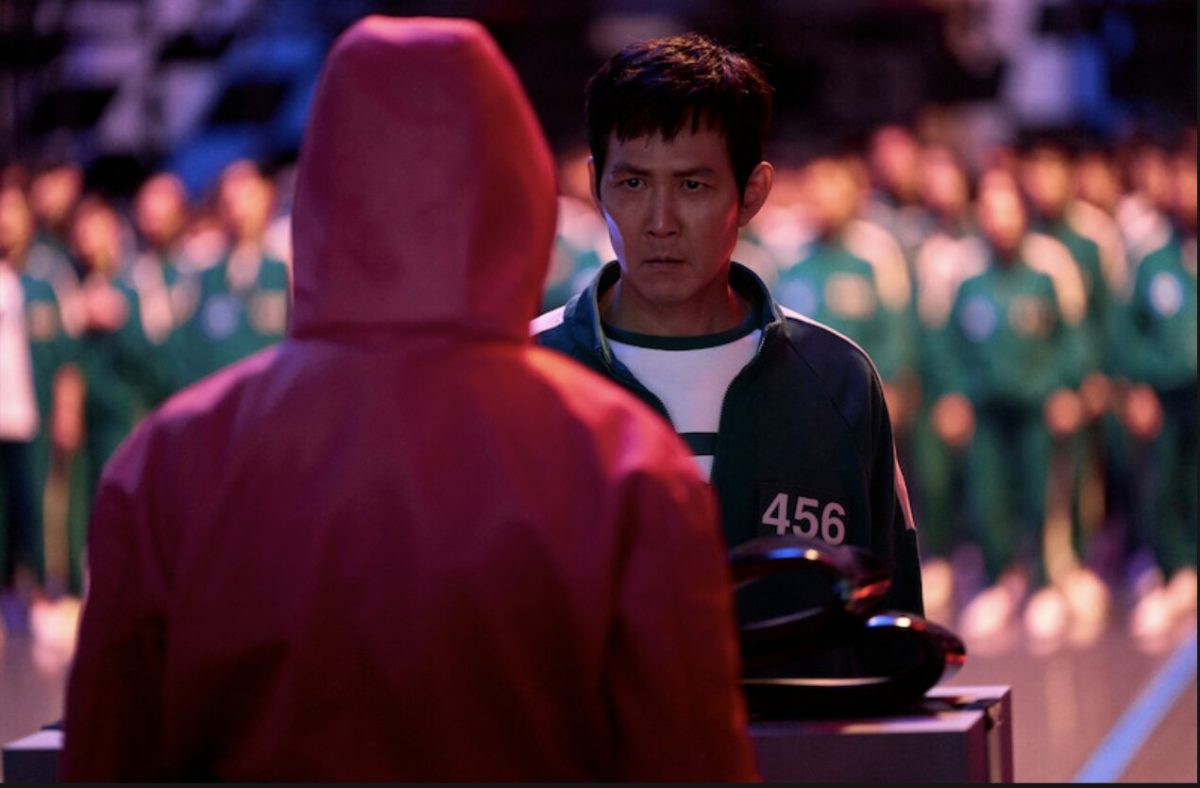Academy Award for Best Picture 2020: Who deserves to win?
Photo caption: In “Parasite,” one of the leading Best Picture nominees, the poverty-stricken Kim family attempts to make a living by exploiting the wealthy Park family.
February 9, 2020
The Academy Awards will air tonight at 5 p.m. on ABC. For a last-minute briefing on who is up for Best Picture and how good the films actually are, The Burlingame B’s reporters have written a guide to the nine nominees.
“Ford v Ferrari”
By Aidan O’Sullivan, senior reporter
“Ford v Ferrari” checks all the boxes for a high-quality film worthy of a Best Picture nomination. Set in the 1960’s, “Ford v Ferrari,” directed by James Mangold, portrays one of the most famous stories in motor sports history. As Henry Ford II looks to get into racing, he attempted to buy a Ferrari, upsetting Enzo Ferrari. Out of anger, Ford hires Carroll Shelby (Matt Damon) to do whatever it takes to design a car fast enough to beat out Ferrari at the 24-hour Le Mans race. Shelby goes on to hire Ken Miles (Christian Bale) to drive in the race.
Mangold is able to capture the audience’s focus and attention through crisply filmed car scenes and strong chemistry between cast members. “Ford v Ferrari” is a fun, action-packed, drama-filled film with great cinematography and acting and makeup, but if you’re looking for a most accurate depiction of the events of “Ford v Ferrari,” you are going to have to do some outside research. Although the film is mainly accurately depicted, Mangold does disconnect slightly from the events, leading to some differences between the film and reality. All in all “Ford v Ferrari” is a standout film that will keep you entertained from start to finish, while also giving doses of entertaining drama throughout the film.
“The Irishman”
By Tekla Carlen, editor-in-chief
“The Irishman” is one of the most self-indulgent movies I have ever seen. And yes, self-indulgent can be done well. “Titanic” is over three hours, and James Cameron nearly went bankrupt constructing the set, but that movie works. “The Irishman” is three-and-a-half hours of mob bros beating each other up and using clichéd accents.
None of the acting is bad. Industry legends Al Pacino and Joe Pesci are both up for Best Supporting actor, and Obama himself said “The Irishman” was one of his favorite movies of 2019—though of course Obama is famous for his political accomplishments, not his judgments of cinema. I just cannot bring myself to care for the protagonist, Frank Sheeran (Robert De Niro), who treats his wife and his daughter terribly. In fact, all the men in this movie are gluttonous and stereotypical mob members. Maybe if Martin Scorsese had involved more women in the making of this film, the characters would be more likably three-dimensional.
I did not hate this movie, and I could easily see Scorsese winning Best Director if “1917” falls through. It is a well-made film, and it does the organized crime shtick well. Unfortunately, it does not say anything fresh about organized crime, though. Will people really care about “The Irishman” in five years’ time? I doubt it. And honestly, the highly praised de-aging of the older characters’ faces did not look that real.
“Jojo Rabbit”
By Jacob Lubarsky, copy editor
Jojo Rabbit, a comedy written by Taika Watiti, is about Jojo (Roman Griffin Davis), a young boy in Hitler Youth training in 1945. He has an imaginary friend who is literally Adolf Hitler. Going into this film, I was worried that it would be hard to find humor in a movie surrounding one of the darkest moments in history. But Waititi pulled it off beautifully, as he manages to perfectly blend tragedy and comedy into one masterpiece. The imaginary Hitler is played by Waititi himself and every time he’s on-screen, he does a wonderful job of making one of the most evil figures in history seem like a caring friend and inspiration from naïve Jojo’s perspective, although Hitler is portrayed in a more negative light as Jojo becomes less prejudiced.
Along with Waititi, the acting was nothing short of superb — Roman Griffin Davis and Scarlet Johansson as his mother did a fabulous job of recreating a mother-son relationship and carried this movie from good to great.
The film also deals with the more realistic aspects of World War II, as Jojo is faced with an issue of morality when he finds out that his mother is concealing a young Jewish girl in their house. The unusual relationship between Jojo and Elsa (Thomasin McKenzie) creates incredible dialogue and scenes, making me care about both characters.
The film is also hilarious. Almost every joke was well-written and never felt like a cash grab. The film consisted of beautiful shots, amazing writing and exceptional directing. Overall, Waititi did a wonderful job on this film and there is no question why this movie is a Best Picture nominee.
“Joker” *
By Jacob Lubarsky, copy editor
The highly anticipated “Joker” movie premiered on Oct. 4, making $258 million worldwide by its first weekend. To me, this was the best interpretation of the classic comic book villain to date. Directed by Todd Phillips, “Joker” follows Arthur Fleck, a mentally ill man with a tragedy-filled life, who transforms both mentally and physically into the Joker.
In early “Batman” comics and television shows, the Joker was said to have transformed by falling into a tub of chemicals, turning him into a clown with a pale white face, red lips and lime-green hair. The new film describes the Joker’s transition into the infamous villain in a far more depressing, yet realistic manner. In the film, Gotham City removes funding that benefits the lower-class citizens—in Fleck’s case, therapy. This causes him to have a grudge against society, something that the audience can sympathize with. The movie gives an extremely realistic view into the lives of mentally ill people, as well as the way they view society.
As for actor Joaquin Phoenix, his interpretation of the Joker is perfect. He gives the character a unique laugh, feel and understanding. He does a fabulous job portraying the feeling of a destroyed man whose society has turned against him at his rock bottom.
The film is flooded with gorgeous cinematography including detailed close-ups, wide shots and everything in-between. With great writing, acting, editing and directing, “Joker” is nothing short of a masterpiece. Unless you are looking for a feel-good type of movie, I would strongly recommend that you watch this soon-to-be classic.
“Little Women” **
By Amelia Harris, copy editor
I was worried when I read that there would be a new film adaptation of Louisa May Alcott’s “Little Women.” I thought this classic book didn’t need to be ruined by another one of Hollywood’s attempts to dramatize and overromanticize a timeless story. Yet knowing Greta Gerwig, who previously directed “Lady Bird,” would direct the 2019 version of “Little Women” assuaged my fears. I was eagerly anticipating the release of “Little Women” as “Lady Bird” is one of my favorite movies, and Gerwig did not disappoint.
Gerwig manages to maintain the plot of Alcott’s original story and includes details from the original book while making it her own by weaving together storylines and timeframes. The plot opens with the girls grown up and making their way in the world but shifts back to their teenage years throughout in order to show the impetus for each current monumental event in their lives. As the film begins, the four sisters—Meg (Emma Watson), Jo (Saoirse Ronan), Amy (Florence Pugh) and Beth (Eliza Scanlen)—are living separate lives: Jo is in New York working as a governess and writing unfulfilling stories for money, Meg is married to poor tutor John, Beth is sick at home and Amy is in Paris with her Aunt March (Meryl Streep) and boy-next-door Laurie (Timothée Chalamet). The movie then seamlessly transitions to the beginning of Alcott’s story, when the girls are growing up in Massachusetts next to Laurie and begin to form a friendship with him and his grandfather.
Gerwig’s version of “Little Women” creates an emotional attachment between the viewer and the characters from almost the beginning of the movie. When Beth becomes gravely ill for the second time, not only could I sense the worry in the family but I found myself crying with them and feeling just as sad about her death. As the viewer falls in love with Laurie and Jo’s budding romance and then watches as Jo breaks his heart, they’re eventually forced to shift mindsets when Laurie woos Amy in Paris. Though I preferred Jo and Laurie together, watching as Laurie and Amy’s marriage flourishes it is impossible to not ultimately support them.
Though the costumes and set match the time period, some of Jo’s mannerisms seem to fit the modern day and bring a contemporary feel in order to modernize the otherwise old-fashioned storyline. In the book, Jo was known for acting unladylike, a likable quality she upholds in the movie.
Gerwig keeps a feminist lens on the movie, addressing the gender roles of the day head-on, with Jo explaining to Laurie that “marriage is an economic proposition” and declaring that she desires independence too much to marry, a rare statement for a woman of her day, despite her eventually getting married. Much of this is the same as in Alcott’s novel, attributable to Jo’s character but still appreciated.
Don’t fear if you are a fan of Alcott’s story, Gerwig manages to put a unique spin on it while staying true to the original plot. “Little Women” does an excellent job of portraying the sisters’ personalities in a way which the reader can relate to without becoming overly modern and losing track of original story. This is a must see movie for anyone who is a fan of the book or looking for a family-friendly film.
“Marriage Story”
By Hanna Sato, chief photographer
Marriage Story is one of Noah Baumbach’s many heart-wrenching tales about how love can be both beautiful and excruciating, through the depiction of a couple’s grueling divorce. The film begins on a sweet note as Nicole (Scarlett Johansson) and Charlie (Adam Driver) describe what they love most about each other. Yet this list of characteristics is not an endearing declaration of their love but an assignment from their mediator.
The couple is torn apart as their different ambitions and desires drive a wedge between them. On the surface, they appear to be the ideal New York couple, Charlie a director of several successful plays and Nicole his leading lady. But underneath, Charlie is consumed by his work and ignores Nicole’s desires. Nicole resents the fact that she left behind what could have potentially been a successful Hollywood career for a life of domesticity and being just another actor in her husband’s plays.
Nicole serves Charlie divorce papers, making it clear she wants to keep the situation as civil and painless as possible, to which Charlie agrees. But as the two both hire ruthless lawyers, this quickly changes. The couple goes to court to settle, where their lawyers attempt to paint the other party as negatively as possible. Despite this, Nicole and Charlie continue to act civilly with each other, working together to ensure the smoothest transition for their son, Henry.
The two eventually decide to settle outside of court, engaging in a bitter and heartbreaking argument, during which Nicole declares Charlie is consumed by selfishness and Charlie punches a hole in the wall out of anger. Both break down and comfort each other. Their argument reveals that they still very much love each other and have no desire to harm the other. They continue with their original plan, settling as painlessly as possible.
The film ends on a bittersweet note, showing Nicole and Charlie in a civil, yet painful relationship as they share their son and move their separate ways. Baumbach effectively shows the way love can break and the harsh reality of divorce.
“1917”
By Aideen Delahunt, staff reporter
The most startling, award-winning trait of “1917” is not its mind-blowing visual effects. It’s not even the incredible performance given by acting newcomers and veterans alike. No. The film’s métier is its brilliant simplicity. The straightforward plot, with its one storyline covering 24 hours with minimal cuts, adds an entirely new layer of horror. The audience isn’t watching a movie about World War I. They are fighting for their lives in the trenches of “the war to end all wars.”
Lance Corporals Schofield (George MacKay) and Blake (Dean-Charles Chapman) embark on a mission that could save thousands of soldiers, including Blake’s brother (Richard Madden). But if they fail, every one of them will run into a German death trap. Though the plot of the movie is essentially a dangerous venture through no man’s land and German territory, its focus is on the extremes of humanity and cruelty that inevitably come with warfare. When a plane crashes and goes up in flames, Schofield and Blake immediately run to the fire and drag the pilot out. The plane and its pilot are German, but the English soldiers do everything they can to save him. After all, the young German is in the same situation. The old politicians and generals on both sides remain safely behind the cover of their ranks and dream up wars. Wars that ship their own young men to the trenches like lambs to the slaughter. These men are only pawns, and Schofield and Blake (and the audience) understand that.
The camerawork, the cinematography, the acting—every aspect of “1917” is absolutely incredible. It’s stunning and a huge breakthrough in the world of filmmaking, and it is definitely going to win the team behind it an Oscar in one of the ten categories it is nominated in. But more than anything, it is the uselessness of war and the tragedy of wasted youth that sticks with you long after you leave the theater. It haunts you. In the best way possible. It will make you hurt but it will make you think. If you want to understand one of the most powerful wars in history and how shockingly similar it is to now, “1917” has to make your list.
“Once Upon a Time in Hollywood”
By Aideen Delahunt, staff reporter
I went into this film with all eight of Quentin Tarantino’s movies and years of true crime knowledge under my belt, so I felt I had a pretty good idea of how this Hollywood and Charles Manson-themed film was going to go. But I was mistaken. Of course, the dialogue and character dynamics didn’t stray far from the unique style of the director, but the relaxed, day-in-the-life plot was worlds away from the action-packed stories of his past movies.
The film boasted a talented cast: Leonardo DiCaprio, Brad Pitt and Margot Robbie snatched the main roles, and Al Pacino, Luke Perry, Maya Hawke, Dakota Fanning and many more portrayed memorable background characters. DiCaprio and Pitt, who had never worked together before, did an incredible job portraying the friendship of an aging Hollywood actor, Rick Dalton (DiCaprio), and his stunt double, Cliff Booth (Pitt), as they attempt to stay relevant in an ever-changing Hollywood. While Rick tries to crawl back in the limelight by guest starring as the villain on a new TV show, Cliff gets mixed up with a group of hippies which the audience knows all too well as members of the Manson family cult. There is a cloud over the film, as we get to know Robbie’s character, Sharon Tate, as a sweet, funny and talented woman. And although Tarantino has a history of rewriting history in his films, it was hard not to be anxious throughout the movie knowing that Tate, eight-and-a-half months pregnant, was brutally murdered in the summer of 1969 by the Manson Family. Tate and Manson weren’t the only real life characters in the film—Roman Polanski, Steve McQueen, Bruce Lee and many others were featured.
The film got the regular criticisms Tarantino gets: too offensive and too violent. To be honest I am truly unsure what these viewers expected in a movie set in the sixties that surrounds one of the most infamous cults of all time. If you want a family-friendly movie, this is not for you. But if you want a beautifully written film with a brilliant cast playing genuine characters, you can’t miss “Once Upon a Time in Hollywood.”
“Parasite”
By Tekla Carlen, editor-in-chief
“Parasite” is a stunning movie about two families. One lives in a basement with flooding concerns and stolen Wi-Fi, while the other lives in a large, elegant house with private cooks and drivers. The two families meet when the wealthier employs the poorer, and chaos ensues. The clever Kim family, headed by patriarch Ki-taek (Song Kang-ho), schemes to milk as much money as they can from the Park family, especially from the well-intentioned but gullible mother, Yeon-gyo (Cho Yeo-jeong). “Parasite” is a story about how class affects people’s motivations and relationships with others.
My favorite part of the film was the delightful ensemble cast. From the daughter in the Kim family (Park So-dam), who sings a rhyme to remember her made-up backstory, to the troubled young son of the Park family (Jung Hyeon-jun), whose mother mistakenly believes he is a gifted artist, everyone has well-developed quirks and compelling personalities. None of the characters have particularly strong morals, but it is easy to root for them, anyway. “Parasite” is funny, which makes its serious message work. On the surface, it is a black comedy, but there is also murder and cruelty shown in a more somber light.
“Parasite” is one of the best movies of the year, and it has many nominations from other prestigious awards ceremonies already. It won the Palme d’Or at Cannes in a rare unanimous vote. Even so, I am not holding out much hope that it will get Best Picture at the Academy Awards. None of the previous winners have ever been non-English language films, and after the Mexican hopeful “Roma” lost last year, the trend is unlikely to change. None of the actors from “Parasite” were nominated, which I find unfair. Cho Yeo-jeong did so much more as a supporting actress than Laura Dern in “Marriage Story,” but the Academy knows and respects American household names better. Bong Joon-ho, the genius director of “Parasite,” has been outspoken about the ignorance of Academy voters. Infamously, he called the Oscars a “local” film festival. Unfortunately, I fear he may be right.
* This review was originally printed in the October 2019 edition of The Burlingame B.
** This review was originally published online on Jan. 3, 2020.




















































Vishwanath Prathikanti • Feb 9, 2020 at 9:27 pm
Great reviews! I thought the cinematography in marriage story was excellent but the slow pace coupled with an abrupt ending and painful subject made it so that I couldn’t enjoy it as much as I thought I would. I would’ve liked to hear some of Sato’s actual thoughts on the movie in her review 🙁